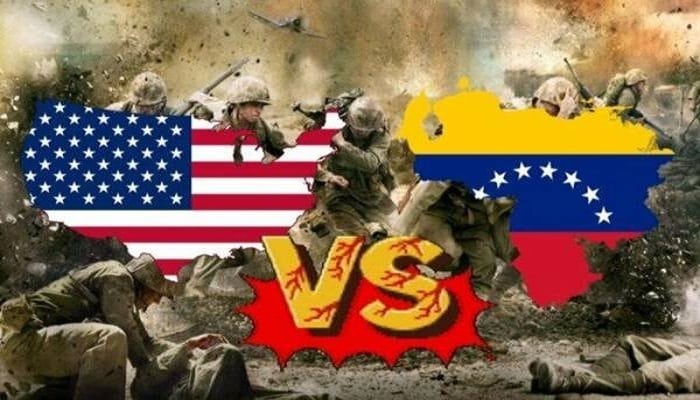PNN – By deploying the largest military fleet in the Caribbean and authorizing operations by the CIA, Donald Trump has brought Venezuela to the brink of a war that could set all of Latin America ablaze.
The Caribbean, the Pacific Ocean of Latin America, has now become the scene of the largest US military movements since the 1980s. In his second term as president, Donald Trump has once again sought to overthrow Nicolas Maduro, and more than 10 percent of the total US military capacity is now present in Caribbean waters. Four destroyers, a nuclear submarine, a guided missile cruiser, and more than 4,500 US Navy personnel, along with F-35 fighter jets, B-52 strategic bombers, and spy drones, create a picture that goes beyond a counter-narcotics operation.
Since mid-August 2025, US forces have carried out at least six deadly attacks on boats in international waters, killing 27 people, without providing any convincing evidence that they were carrying drugs. On October 15th, Trump authorized covert CIA operations on Venezuelan soil, stating openly: Now we are looking for land. The bounty for Maduro’s capture was increased from $25 to $50 million, Marco Rubio, Maduro’s staunchest opponent, became Secretary of State, and the White House declared the ultimate goal to oust Maduro.
Read more:
From the excuse of the war on drugs to the blockade of Venezuela
According to the Center for Strategic and International Studies (CSIS), this is the largest US military presence in the region since the 1980s. F-35 fighter jets have been deployed to Puerto Rico, the Roosevelt Roads military base, which had been closed for more than two decades, has reopened, and B-52 bombers are flying threatening flights off the coast of Venezuela. Fighter jets and “Little Bird” Special Forces helicopters have been spotted near Trinidad, 90 miles off the coast of Venezuela.
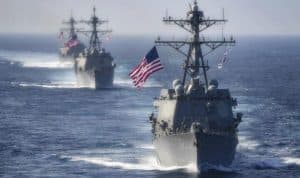
The darker side, however, is the deadly attacks on boats; since September 2, US forces have launched six missile attacks on boats, killing 27 people. Samuel Moncada, Venezuela’s ambassador to the United Nations, called the operations “extrajudicial executions.” International law experts say these attacks are a clear violation of human rights and international law, but the US has acted based on the logic of “shoot first, ask questions later” without any investigation, trial, or legal process.
On October 15, Trump authorized CIA operations in Venezuela, saying that US forces were ready for ground operations. The Wall Street Journal reported that the number of troops was insufficient for a full-scale invasion, but sufficient for airstrikes and assassinations of leaders. Trump calls this a “war on drug cartels,” but the real goal is to overthrow the Maduro government and seize the world’s largest oil reserves.
Violation of national sovereignty; Trump and Rubio’s hegemonic policy
The US military moves are a clear violation of the UN Charter and a return to 19th century colonial policies. Marco Rubio has been calling for a military attack on Venezuela for years and raised the proposal in White House meetings in 2020. Now that he has become Secretary of State, his wish is coming true.
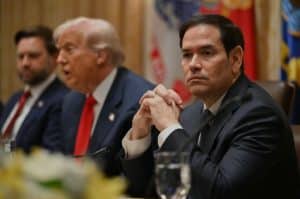
In 2019, Trump recognized Juan Guaido as the legitimate president of Venezuela, but his intervention failed. He even suggested to the then-president of Colombia that he attack through Colombia. He has now returned with a more aggressive approach. The Venezuelan government has repeatedly requested negotiations, but Washington has rejected all offers.
Venezuela requested an urgent meeting of the UN Security Council on October 9. At the meeting on October 11, Russia strongly criticized the US actions, saying: There is no way to verify Washington’s claim that the boats belonged to cartels. They were killed without trial on the high seas. China also stressed respect for national sovereignty.
By designating the “Cartel of the Suns” – of which Maduro is the leader – as a terrorist organization, the Trump administration has created a legal framework to justify the attacks. History has shown that the US has repeatedly used these pretexts to intervene, including Grenada in 1983, Panama in 1989, and numerous coups against leftist governments. Now Venezuela, with the world’s largest oil reserves, is the next target.
Is the response of the Venezuelan government and people decisive and deterrent?
The Venezuelan government and people responded decisively to US threats. Maduro appeared in military uniform on September 5 and said that if the US attacked, the country would enter an “armed phase of struggle.” About two weeks later, he signed a state of emergency decree and announced that he had mobilized more than 4.5 million paramilitary forces of the “Bolivarian Militia.”
It should be noted that the “Bolivarian National Militia” is a paramilitary institution composed of popular forces that was created in 2009 during the presidency of Hugo Chavez, and the Maduro government has now relied on it against what it calls a “military threat.”
“Operation Independence 200” began on October 10th, involving a nationwide mobilization of military forces, militias, police, and social forces. By October 17th, 20 of the 23 states had been fully militarized. Some 17,000 military personnel were deployed on the border with Colombia. Maduro ordered civilian ports to be militarized, and Russian air defense systems and anti-ship missiles were deployed at key points.
Maduro emphasized the “right to self-defense” and said: “We defend our seas, our skies, and our lands. No empire should touch the sacred soil of Venezuela.” He accused the CIA of “organizing coups and assassinating leaders.” That same month, Venezuela’s defense minister declared: “The armed forces are ready to defend the territorial integrity and sovereignty of the country.”
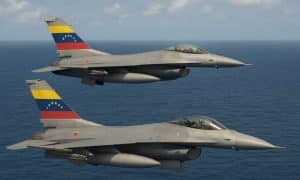
At the same time, thousands of people demonstrated in Caracas and major cities in support of the government and against US threats. This shows that despite economic difficulties, a significant part of society is united in the face of a foreign threat.
Is Trump Really Looking for War? / Examining Three Scenarios
Is Trump really seeking war and direct military confrontation? Analysts see three possible scenarios: first, continued pressure for internal collapse of the regime. Second, limited airstrikes against government facilities. Third, assassination operations or a military coup backed by the CIA.
A large-scale ground invasion is unlikely, as Venezuela, with its 29 million people, mountainous terrain, and millions of mobilized troops could become “another Vietnam,” but the risk of airstrikes and assassinations is very serious.
On the other hand, the costs of war would be high. Venezuela has advanced Russian air defense systems, millions of militias, and a difficult geography. In addition, it could benefit from the support of Russia, China, Iran, and Cuba. Russia has recently announced that it “supports Venezuelan sovereignty and condemns foreign intervention.” In addition, China, which has invested $60 billion in Venezuela, cannot remain indifferent.
Politically, a war could spark a new wave of anti-Americanism in the region. Brazilian President Lula da Silva said a week ago: Latin America should be a region free from foreign interference. Economically, war could seriously damage the global oil market and cause a massive humanitarian crisis. The United Nations has warned that the conflict could lead to the displacement of millions of people.
Some analysts believe that Trump may settle for a limited attack, such as bombing oil facilities or military bases, to portray himself as a decisive president, but such an attack is not without risk. Venezuela could retaliate by attacking Colombian oil infrastructure or by carrying out retaliatory operations through affiliated groups.
Ultimately, full-scale war is a possibility but not a certainty. Trump must consider the political, economic, and military consequences. He now faces a team more radical than himself, a dangerous combination that could lead to a strategic miscalculation.
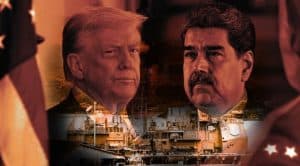
Return to “Big Stick” Politics and an Uncertain Fate
What is happening in the Caribbean today is more than a bilateral crisis. It is a historic test for the rules-based international order. Trump has returned to the “big stick” policy of the 19th century, a policy that presented the United States as the gendarme of Latin America.
History has shown, however, that such policies have always met with resistance from nations and have failed. Vietnam, Iraq, and Afghanistan are testament to the fact that military power cannot defeat the will of a nation.
Latin American history is full of bitter examples of US interventions, such as the 1954 Guatemalan coup, the 1973 overthrow of Allende in Chile, support for the Contras in Nicaragua, and the 1989 invasion of Panama. All of these cases show that Washington has never stopped interfering, but each time it has led to instability, violence, and suffering.
Not Trump, Rubio, and the Pentagon, but the Venezuelan people have the right to self-determination; this is the inalienable right of all nations and the fundamental foundation of the international order. Violating this right is a violation of all the values that the international community has built since World War II.
As can be seen from a look at history, America’s interventionist and hegemonic policy not only harms regional peace, but also undermines Washington’s moral credibility. The US, which claims to lead the free world, is now violating the national sovereignty of an independent country. This contradiction is a crisis of American identity and credibility in the contemporary world order.
Overall, the tensions between the US and Venezuela have not yet escalated into a full-scale war, but by monitoring the movements on the ground and the verbal positions, the risk is very serious. The international community must be vigilant, raise its voice, and stand against this aggressive US policy. The Venezuelan nation must also be prepared to defend its independence, sovereignty, and dignity; because history has shown that resilient nations will ultimately prevail.

